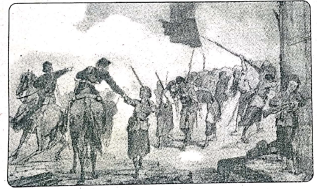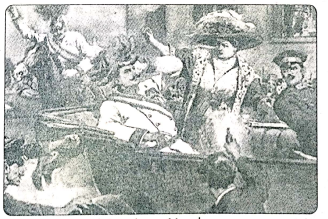Class 9 History Solution WBBSE Chapter 4 Industrial Revolution, Colonialism And Imperialism Topic A Industrial Revolution Short Answer (SA) Type Questions
Question 1. What was the Industrial Revolution?
Answer:
Industrial Revolution:-
During the second half of the 18th century, far-reaching changes began in the economic life of the people as a result of scientific inventions in different industries. These changes are referred to as the Industrial Revolution.
Industrial Revolution means a thorough transformation in the methods of production and transportation, the general substitution of power-driven machinery for hand labour. Human labour came to be replaced more and more by machines producing more goods.
Industrial Revolution, Colonialism and Imperialism
Question 2. What are the main features of Industrial Revolution?
Answer:
The main features of Industrial Revolution are:
[1] Mechanisation of industry and use of modern technology for production
[2] Produc- tion of goods by machines and factories instead of individual labour and cottage industries
[3] Investment of huge amount of capital
[4] Marketing the finished goods on a large scale for profit.
[5] Introduction of modern transport system.
Read and Learn More WBBSE Class 9 History Short Answer Questions
Question3. What conditions are necessary for industrialisation?
Answer:
The following conditions are necessary for industrialisation.
[1] Natural resources like coal and iron
[2] Sufficient capital
[3] Plenty of raw materials
[4] Cheap labour
[5] Markets for finished goods
[6] Political stability
[7] Favourable government policy
[8] A cheap and efficient system of administration
[9] Suitable climate
[10] Enterprising and energetic people.
Class 9 History Solution WBBSE
Question 4. Which are the main locations of the Manchester, Glasgow, Bristol, Liverpool etc. Industrial Revolution?
Answer: The main locations of the Industrial Revolution were: England, Belgium, France, Germany, Italy, Russia, USA, Japan and China.
Question 5. Name two scientific inventions which helped in Industrial Revolution in England.
Answer: Two scientific inventions which helped in Industrial Revolution in England are:
[1] The steam engine was invented by James Watt and
[2] Safety Lamp was invented by Humphry Davy.
Question 6. What do you mean by division of labour?
Answer:
Division Of Labour:-
An important aspect of the Industrial Revolution is the division of labour. The productive process is divided into several parts and each part was to be produced separately. Division of labour helps in the specialisation of a particular process but the labourer becomes ignorant of the total system of production.
Question 7. How did the Industrial Revolution lead to the growth of new cities?
Answer: Before the Industrial Revolution, people lived primarily in villages. Agriculture was the main occupation of the people. After the Industrial Revolution, there was a migration of displaced agricultural labourers to industrial areas on a large scale who sought and found employment in the industries. Towns gradually developed around these industrial centres.
Question 8. Name two industrial cities of England.
Answer: Two cities which developed around the industrial areas in England are-
[1] Manchester and
[2] Leeds.
Question 9. Name some industrial cities which grew up as a result of industrial revolution.
Answer: Some industrial cities which grew up as a result of industrial revolution were Manchester, Glasgow, Bristol, Liverpool etc.
Question 10. What is industrial capital?
Answer:
Industrial Capital:-
From after the Industrial Revolution the capitalists of England invested huge capital on industrial production rather than investing in trade and commerce. This capital is called ‘Industrial Capital’.
Class 9 History Solution WBBSE
Question 11. Why did Industrial Revolution first start in England?
Answer:
Industrial Revolution first started in England because of
[1] The political stability of the country.
[2] England’s unrivalled power in overseas trade
[3] Availability of cheap abundant-wage labourers
[4] Huge colonies in different parts of the world
[5] A good network of navigable rivers
[6] An abundance of natural resources like coal and iron.
Question 12. Mention two reasons why industrialisation started late in Russia.
Answer:
Two reasons why industrialisation started late in Russia were:
[1] the Russian feudal lords were more interested in agriculture rather than on industries.
[2] There was lack of industrial capital in Russia.
Question 13. Why was England known as the ‘manufactory of the world’?
Answer: Industrial Revolution first took place in England. Big mills and factories were established which produced huge quantities of goods. In the 19th century, England alone produced half of the worlds’ industrial manufactured goods. So England was known as the ‘manufactory of the world.’
Question 14. Why continental goods could not compete with British-made goods in the international market?
Answer:
Continental goods could not compete with British-made goods in the international market because:
[1] The quality of British-made goods was very high.
[2] England had a huge colonial market.
[3] England had a strong navy.
Question 15. Why did the factory system develop?
Answer:
Development Of Factory System:-
Before the factory system there was a localised form of production. Production was made one at a time by individual workers at small workshops or at home. As machines became larger, huge quantities of goods were produced within a short time with the help of machines. Division of labour was introduced. This was not possible in the case of cottage industries. So factory system was developed.
Question 16. Why did industrialisation start late in France than in England?
Answer:
Industrialisation started late in France than in England because:
[1] France was torn by the availability of coal
[2] None- of capital
[3] Lack of transport
[4] Lack of revolution during 1789-1848.
[5] Undeveloped banking system
[6] Industrialisation was, not encouraged by rulers
[7] Medieval outlook on life.
History Class 9 WBBSE
Question 17. How did the natural environment help in the Industrial Revolution of England?
Answer:
The natural environment helped in the Industrial Revolution of England because:
[1] Raw materials were easily available
[2] A good supply of coal and iron
[3] Suitable climate for spinning
[4] Good network of navigable rivers.
Question 18. What was the role of women in the Industrial Revolutions of England?
Answer: As the Industrial Revolution unfolded in England, women got themselves involved in textile mills, factories and mines. They were employed by factory owners in large numbers and were paid very meagre wages. Their terms of work were humiliating and they were compelled to live in filthy urban slums.
Question 19. Which is the First International Working Men’s Union? When was it established and under whose leadership?
Answer: The First International Working Men’s Union is the Communist League.
It was established in 1847 under the leadership of Karl Marx.
Question 20. What is ‘Habeas Corpus’?
Answer:
Habeas Corpus:-
Habeas Corpus is a court order requiring a person under arrest to be brought before a judge or into court and show a valid reason for that person’s detention. It safeguards individual freedom against unlawful and indefinite imprisonment.
Question 21. What do you mean by ‘Luddite riot’?
Answer:
Luddite Riot:-
‘Luddite riot’ was a protest movement of the workers led by General Ned Ludd in England. The rioters demanded
[1] a minimum wage.
[2] control over labour for women and children.
[3] work for those who had lost their job because of the coming of machinery and
[4] right to form trade unions so that they could present these demands legally and officially.
History Class 9 WBBSE
Question 22. What is Paris Commune?
Answer:
Paris Commune:-
In 1871, the revolutionary workers of Paris established an organisation known as Paris Commune and defied the central government and captured power. On 18 March this Commune exercised administrative power in Paris for almost two months.

Question23. What is ‘Bloody May Week’?
Answer:
Bloody May Week:-
In 1871 when the revolutionary workers of Paris established the Paris Commune in order to take over the administration of Paris in their own hands, the soldiers of the French government fired indiscriminately on the revolutionary workers. There was desperate fighting for a week (22 May-29 May). About 17,000 persons were killed. Historians refer to this week as ‘Bloody May Week’.
History Class 9 WBBSE
Question 24. What is the ‘March of the Blanketeers’?
Answer:
March Of The Blanketeers:-
Thousands of workers started a march in 1819 from Manchester towards the Parliament House in London in order to put forward their long-standing demands for improvement of their working conditions. The workers carried with them their blankets on their shoulders for sleeping at night. This was known as the ‘March of the Blanketeers’.
Question 25. Who are called ‘Utopian Socialists’?
Answer:
Utopian Socialists:-
The pre-Marxist socialists and thinkers are called early socialists or ‘Utopian Socialists’. Some well-known Utopian socialists were Saint Simon, Charles Fourier and Robert Owen.
Question 26. Name the books which contain the political ideals of Karl Marx.
Answer:
The books which contain political ideals of Karl Marx are:
[1] Communist Manifesto
[2] Das Capital
[3] Critique of Political Economy
[4] Poverty of Philosophy.
Question 27. Name some Utopian socialist thinkers.
Answer:
Some Utopian Socialist Thinkers:-
Robert Owen, Charles Fourier, Saint Simon, Louis Blanc, and Proudhon are some of the Eutopian socialist thinkers.
Question 28. Who is known as the ‘Father of anarchism’? Name some propounders of Name some propounders of anarchism.
Answer:
1. Proudhon is known as the ‘Father of anarchism’.
2. Some propounders of anarchism were Bakunin, Murray Bookchin, Alexander Berkman, Camillo Berneri etc.
Class 9 History WBBSE
Question 29. Mention two demerits of Utopian socialists.
Answer:
Two demerits of Utopian socialists were:
[1] The Utopian socialists were imaginative socialists without any practical sense.
[2] The Utopian socialists could not think of the class struggle. They never understood that the interest of the worker and the employer were antagonistic and mutually divergent.
Chapter 4 Industrial Revolution, Colonialism And Imperialism Topic B Colonialism and Imperialism Short Answer (SA) Type Questions
Question 1. What do you understand by the term “Imperialism”?
Answer:
Imperialism:-
The term ‘imperialism’ means the practice of extending the control, power or rule by a country over the economic and political life of the people of areas outside its own boundaries. This may be done by direct rule over the country, or indirect control of the people or through settlements. The essential feature of imperialism is exploitation. The imperialist power subordinates the colony of the country which it controls indirectly to serve its own economic and political interests.
Question 2. What is colonialism?
Answer:
Colonialism:-
Colonialism is a system whereby in an attempt to increase profits and control markets and raw materials, countries try to dominate and control weaker nations and turn them into their colonies. Colonies are ruthlessly exploited by the dominant country.
Class 9 History WBBSE
Question 3. What is Neo-colonialism?
Answer:
Neo-Colonialism:-
Neo-colonialism means that European countries and the USA, even after decolonisation, exerted a great deal of control over the new states, which continued to need the markets and the investment that the West could provide.
Question 4. How did industrialisation gave birth to imperialism?
Answer:
Two basic requirements of industrialisation are
[1] Regular supply of raw materials and
[2] Markets to sell finished goods.
To meet their needs industrialised countries like Britain, France, Germany, Italy, Russia, and Japan started a scramble to establish colonies in Asia, Africa and Latin America. These colonies served both purposes i.e., as suppliers of raw materials and easy markets to sell finished goods. Industrialisation thus gave birth to imperialism.
Question 5. What do you mean by capitalism?
Answer:
Capitalism:-
Capitalism is an economic system in which the principal means of production, distribution and exchange lie in private hands and are operated for profit. Society is divided among owners of industries and wage earners.
Question 6. In the 19th century, what changes took place in the nature of the trade relations between England and India? Give two reasons for these changes.
Answer: In the 18th century, English merchants used to purchase Indian goods and earn profits by selling them in England and other European countries. In the 19th century, changes took place in the nature of trade between England and India. During this period, Britain did not import goods from India.
On the other hand, the Indian market was flooded with British goods and India who had so long been a manufacturer and exporter of finished goods became an exporter of agricultural products like indigo, cotton, jute and wheat.
Question 7. What were the wars through which the English established their control over blished their control o Mysore?
Answer:
The wars through which the English established their control over Mysore were:
[1] First Anglo-Mysore War (1767-69).
[2] Second Anglo-Mysore War (1780-84).
[3] Third Anglo-Mysore War (1790-92) and
[4] Fourth Anglo-Mysore War (1799).
Question 8. What were the wars through which the English established their supremacy over the Marathas?
Answer:
The wars through which the English established their supremacy over the Marathas were:
[1] First Anglo-Maratha War (1782-85).
[2] Second Anglo-Maratha War (1803-05) and
[3] Third Anglo-Maratha War (1818).
Class 9 History WBBSE
Question 9. What were the battles through which the English had established their supremacy in Bengal?
Answer:
The battles through which the English established their supremacy over Bengal were:
[1] The Battle of Plassey (1757) and
[2] The Battle of Buxar (1764).
Question 10. What do you mean by ‘drain of wealth’?
Answer:
Drain Of Wealth:-
From the 18th century up to the middle of the 19th century the East India Company and its servants collected a huge amount of wealth from India and sent the entire amount to England. This flow of wealth from India to England is known as the ‘drain of wealth’. The ways wealth was transferred to England were presents, collusive contracts, private trade, free merchants and investments.
Question 11. Mention two reasons for the decline of Indian industries during British rule.
Answer:
Two reasons for the decline of Indian industries during British rule were:
[1] Indian goods could not compete with the British. made goods which were fine and cheap.
[2] The imposition of heavy tariffs on Indian goods made them expensive.
Question 12. Which company first established a railway in India and when?
Answer: The first railway was established in India by the Great Indian Peninsular Railway company in 1853.
Class 9 History Solution WBBSE
Question 13. What was declared in the ‘Open Door Policy’?
Answer:
Open Door Policy:-
Sir John Hay, the US Secretary of State, issued the famous Open Door Policy (1899). According to it no Chinese port was to be considered the exclusive property of any particular foreign power.
Question 14. Who was known as ‘Navigator? Name two sailors of his country.
Answer:
Navigator:-
1. The Portuguese sailor Prince Henry was knwon as ‘Navigator’.
2. Two sailors of his country were Vasco da Gama and Bartholomew Diaz.
Question 15. When was the Suez Canal constructed? What is its importance?
Answer:
Suez Canal:-
1. The construction of the Suez Canal began in 1859.
2. The Suez Canal is the connecting link between the Mediterranean Sea and the Red Sea via the Indian Ocean. It is a direct route for shipping between Asia and Europe. It shortened the travel route between Western Europe and ports in East Africa and Asia.
Question 16. Name the countries that rushed to Africa to establish colonies.
Answer:
Name Of The Countries That Rushed To Africa To Establish Colonies:-
The countries that rushed to establish colonies in Africa were Great Britain, Germany, France, Belgium, Italy and Spain.
Question 17. What do you understand by ‘Scramble you understand for Africa’?
Answer:
Scramble You Understand For Africa:-
During the 1800s, France, Britain, Italy, Spain, Germany and Belgium competed with each other to establish a foothold in Africa as it was rich in natural resources. They thought that they were required to do this to maintain their lifestyle and to develop their homelands. This rush among the various European powers to establish colonies in Africa is known as the ‘Scramble for Africa’.
Class 9 History Solution WBBSE
Question 18. How was the Union of South Africa formed?
Answer:
Union Of South Africa Formed:-
The Union of South Africa was formed by the unification of the Cape Colony, the Natal Colony, the Transvaal, and the Orange River Colony. It included the territories that were formerly a part of the South African Republic and the Orange Free State.
Question 19. When did World War I break out? What was the ‘Sarajevo incident’?
Answer: World War I broke out on 28 July 1914. On June 28, 1914, Archduke Francis Ferdinand, nephew of emperor Joseph of Austria and heir to the throne of Austria was assassinated along with his wife Sophia in Sarajevo, the capital of Bosnia, by Gavrilo Princip, a member of ‘Black Hand’ terrorist organisation. This incident is known as the ‘Sarajevo incident’.

Question 20. In which year was the Triple Alliance formed? Who were the members of the Triple Alliance?
Answer:
1. The Triple Alliance was formed in the year 1882.
2. The members of the Triple Alliance were Germany, Austria and Italy.
Question 21. What were the places in Africa where England established her colonies?
Answer: England established her colonies in Africa in places like Rhodesia, Goldcoast, Nigeria, Somali Land, Nagaland, North Egypt, Cape Colony, Orange, Transvaal, Sudan, East Africa, Bechuanaland, Uganda, Gambia etc.
Question 22. In which year was the Triple Entente formed? Who were the members of the Triple Entente?
Answer:
1. The Triple Entente was formed in the year 1907.
2. The members of the Triple Entente were England, France and Russia.

